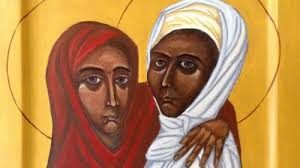HOMILY LENT WEEK 03 04 – Year II
Harden not Your Hearts:
Optional Memorial of Saints Perpetua and St. Felicity
(Jer 7:23-28; Ps 95; Lk 11:14-23)
*********************************************
Healed people heal people; hurt people hurt people.
Sin and sinfulness; stubbornness and disobedience seem to sum up the readings today, inviting us to be just the opposite – a people who are grounded in the wellness of Jesus and able to share that wellness with others.
Jeremiah in the first reading laments that the Chosen People were stubborn, self-willed, full of false pride, disobedient and unfaithful to the covenant, with hardened hearts. They not only sinned out of disobedience, but were also full of stubbornness and false pride.
Jesus had the same experience with the Pharisees – even when he healed people, they were critical, stubborn, with hard and accusatory hearts. Their main sin was disbelief and hypocrisy.
The 12 Step program was needed at that time, because it deals with both sin (wrong-doing) and sinfulness (that which makes us sin). It is our defects of character that make us sin and do wrong – like stubbornness and false pride. Steps 4 – 9 of the program offer both forgiveness for our sin and wrong-doing, and also healing for our sinfulness and defects of character.
Actually, that is what Jesus came to accomplish, with his two-fold mission: to redeem and sanctify; to forgive and to heal; to forgive our sins and to take away our sinfulness, that which makes us sin.
We must put aside our self-sufficiency and allow him to be the “one who is not divided,” the “strong man,” “the finger of God” and the “one who gathers” who will overpower our sin and sinfulness, and thus usher us into the kingdom of God. As Richard Rohr often says, “Whole people create whole people.” Divided people heal nobody, but only scatter others because they are scattered and un-whole themselves. They perpetuate the problem. Their motives, loyalties, identity and their emotions are all over the place. The Greek word for devil is diabolos, which means split or divided, literally “thrown apart.”
Jesus gathers and heals because he is one with himself, with God and even one with the pain of the man who cannot speak. He even wants to be one with the crowd. However, his wholeness threatens those who are not whole, who then accuse him of their own fault, of being a devil. When we fight evil, we will often be accused of evil ourselves – as happens so often to whistle blowers, justice seekers and peace workers. That is probably what was happening to Jeremiah.
Our task is to be grounded in Jesus, to listen to his words, and to do his will. The will of Jesus is that we enter the kingdom through repentance, confessing our sins, opening ourselves up to receive his merciful forgiveness, and letting go of our defects of character by receiving his healing in that area of our lives. Then we are in the kingdom of God. The stakes are truly high.
The psalm is an invitation to have mellow hearts and humble spirits as we worship: “If today you hear his voice, harden not your hearts.”

Saints Perpetua and Felicity
Today, the Church honours Vivia Perpetua, a noblewoman, and Felicity, a slave, who were killed for their faith on March 7, 203, in Carthage, a Roman province of Africa. Perpetua decided to become a Christian knowing it might involve her death while still nursing her baby. As her husband is not mentioned, it is assumed she was a widow. When her father tried to dissuade her, she replied she could not be anything but a Christian. Perpetua’s diary and accounts by eyewitnesses provide a vivid picture of the martyr’s experiences. During the persecution of Christians by Emperor Severus, were several catechumens, among them Perpetua with her infant son and the pregnant slave Felicity. They were baptized while under arrest. Perpetua had visions of what would happen to them, which only deepened her resolve. Felicity gave birth to a baby girl two days before their execution. That baby was adopted and raised as a Christian by one of the Christian women of Carthage. After being flogged, they were led to the amphitheater along with other Christians, exposed to the wild beasts and beheaded. Perpetua and Felicity stood side by side, and are now the patron saints of mothers, expectant mothers, ranchers and butchers.
The Eucharist itself is an experience of God’s love coming to us bearing an abundance of forgiveness and healing if we celebrate it with humble faith.
So, let us pray for that softness of heart and humble spirit opening us up to receive God’s forgiveness and healing through Jesus, listening to his word and doing his will.



